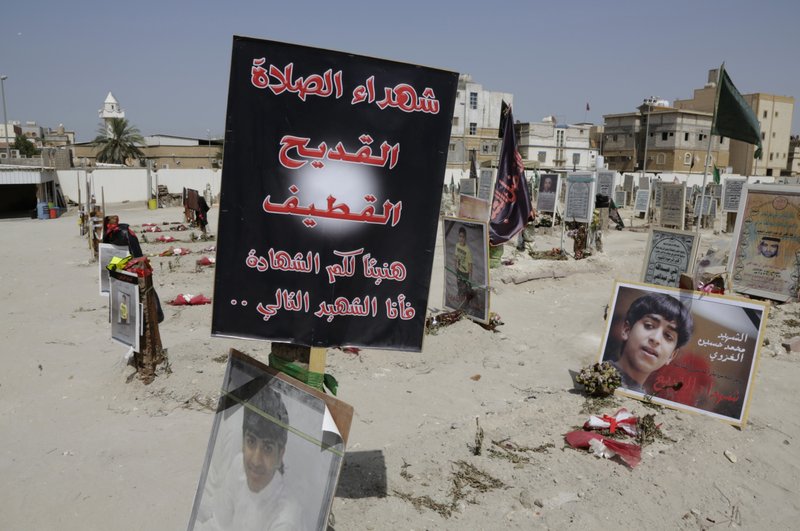DUBAI, United Arab Emirates -- The Islamic State is extending its reach in Saudi Arabia, expanding the scope of its attacks and drawing in new recruits with its radical ideology. Its determination to bring down the U.S.-allied royal family has raised concerns it will threaten the annual Muslim hajj pilgrimage, which begins later this month.
So far, the extremist group's presence in the kingdom appears to be in a low-level stage, but it has claimed four significant bombings since May, one of them in neighboring Kuwait. And it has rapidly ramped up its rhetoric, aiming to undermine the Al Saud royal family's legitimacy, which is rooted in part in its claim to implement Islamic Shariah law and to be the protectors of Islam's most sacred sites in Mecca and Medina that are at the center of hajj.
"Daesh and its followers have made it very clear that Saudi Arabia is their ultimate target," Saudi analyst Fahad Nazer said, referring to the Islamic State by its Arabic acronym. "Because of Mecca and Medina. ... That's their ultimate prize."
An attack last month in which the Islamic State, also referred to by the acronym ISIS, claimed responsibility appeared to mark a significant spread in the group's reach. Militants claiming loyalty to the group had already carried out three major bombings -- two in eastern Saudi Arabia in May and one in Kuwait City in June, all targeting Shiite mosques and killing 53 people.
But on Aug. 6, a suicide bomber attacked in western Saudi Arabia, hitting a mosque inside a police compound in Abha, 350 miles south of Mecca, killing 15 people in the deadliest attack on the kingdom's security forces in years. Eleven of the dead belonged to an elite counterterrorism unit whose tasks include protecting the hajj pilgrimage.
The alleged affiliate that claimed responsibility for the August attack called itself the "Hijaz Province" of the Islamic State, its first claim of a branch in the Hijaz, the traditional name for the western stretch of the Arabian Peninsula where the holy cities are located. The previous attacks were claimed by the group's "Najd Province," the traditional name for the central heartland of the peninsula and the homeland of the Al Saud family.
Lori Boghardt, Persian Gulf security analyst at the Washington Institute, said it would not be surprising if militants tried to take advantage of the hajj to stage an attack, particularly since the group has encouraged lone wolf operations. This year, the hajj begins Sept. 21 and is expected to draw some 3 million Muslims from around the world.
"The kingdom is a holy grail of sorts as a target from the perspective of ISIS because of its significance to Muslims," she said, using the acronym of another name for the extremist group.
But there are other potential targets, including security forces in or around Mecca. The group could attempt to hit pilgrims from Shiite-majority nations like Iran, who would stand out since pilgrims generally move in groups by country. The Islamic State and other Sunni radicals consider Shiites heretics.
Justin Mahshouf, a 30 year-old American Shiite planning to perform the hajj this year, said friends and family are telling him to be careful. "There seems to be a really bad vibe right now in the Shiite community."
Little is known about the structure of the Islamic State in Saudi Arabia. It is not known if the militants in the kingdom have direct operational ties with the group's leadership based in its self-declared "caliphate" in Iraq and Syria -- or if they simply operate independently in the group's name.
In all four attacks claimed by the branches in the kingdom, the bombers were young Saudis, suggesting the group's ranks are largely homegrown as opposed to foreign militants. The bomber in the August attack was identified as Yousef Suleiman, a 21-year-old Saudi with no record of ever having traveled abroad, pointing to the group's ability to radicalize even youth who have not gone to join fighting in Syria.
Since Syria's civil war escalated over the past four years, Saudi Arabia's ultraconservative clerics urged young men to go fight alongside Sunni rebels in Iraq and Syria. Concerned about possible radicalization, the late King Abdullah last year banned fighting abroad or encouraging it. But by then, some 2,500 Saudis had already gone to Syria. The Interior Ministry says about 650 have since returned and that they left disillusioned with the fighting.
This year, Saudi Arabia and other Persian Gulf countries joined the U.S.-led campaign of airstrikes against the Islamic State in Syria.
Saudi Arabia is already run by one of the most ultraconservative interpretations of Shariah, known as Wahhabism. Some of its clerics view Shiites as heretics, are virulently opposed to monuments or tombs they see as encouraging idolatry, believe in a strict segregation of the sexes and support the use of religious police to enforce Shariah rules -- all teachings not far from the Islamic State's ideology.
But Wahhabi clerics make a crucial distinction, preaching that the recognized ruler -- in this case, the Al Saud family -- must be obeyed. They condemn protests or violence that could lead to instability. The kingdom's highest religious authority, Grand Mufti Sheikh Abdul-Aziz Al-Sheikh, denounced the Islamic State and al-Qaida as Islam's No. 1 enemy.
A Section on 09/11/2015


